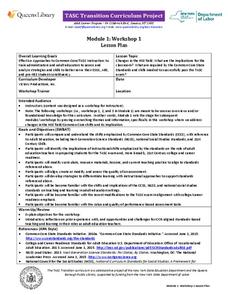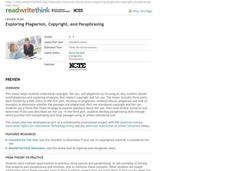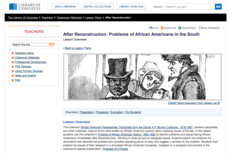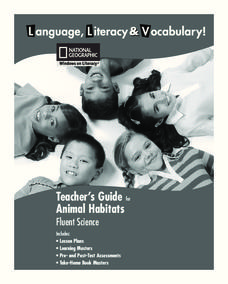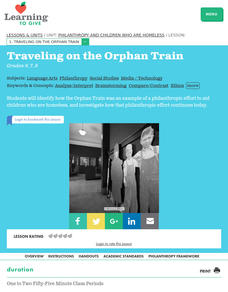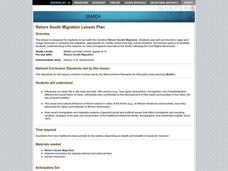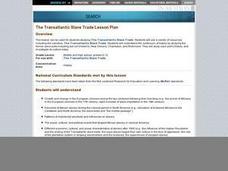EngageNY
TASC Transition Curriculum: Workshop 12
How can opinions slant facts? Workshop participants learn how to examine primary and secondary sources and identify the author's point of view. They also examine how visual art impacts the meaning and rhetoric of sources. Full of...
Library of Congress
Marco Paul's Travels on the Erie Canal: An Educational Voyage
Following the book, Marco Paul's Travels on the Erie Canal, readers complete an activity for each chapter, take part in discussions, and respond to several questions. To show what they know, scholars create an alphabet book using primary...
New York State Education Department
TASC Transition Curriculum: Workshop 1
Work out your core, Common Core State Standards, through the first workshop in a series of 15 designed for educators. Inquiry-based activities designed for all content areas and grade levels explore the shifts to new standards,...
Curated OER
From Graphic Organizer to Composition - Grade Six
How does one use a graphic organizer to plan writing? Introduce your writers to different types of graphic organizers by dividing the class into groups and assigning each group a particular organizer. Then, as they research chocolate...
National Constitution Center
Abraham Lincoln's Crossroads
History enthusiasts participate in an interactive website that brings Abraham Lincoln to life as he shares his personal experiences between 1854-1864. Scholars listen and read carefully to form their own opinions and discover if they...
ReadWriteThink
Exploring Plagiarism, Copyright, and Paraphrasing
Plagiarism, copyright, and fair use are the focus of a three-part instructional activity designed to inform scholars of how to properly cite others' work. First, pupils use a KWL chart to begin thinking and discussing plagiarism. They...
Library of Congress
After Reconstruction: Problems of African Americans in the South
Lynchings, race riots, and Jim Crow laws were just a few examples of antagonism that African Americans faced after Emancipation. Class groups investigate these and other events, and prepare a presentation to inform the class about the...
Curated OER
Reply to a Job Ad
So, you've just spotted an ad for the perfect job, now what? Get kids ready to enter the workforce by having them practice the first step, replying to a job ad. They scan the paper for a job, role-play responding to the ad via phone,...
Australian Government
The Great Artesian Basin
Covering 23% of the continent and holding 64,900 cubic kilometers of water, the Great Artesian Basin is the primary source of water for much of inland Australia. Using detailed student worksheets, experiments, and case studies, young...
National Geographic
Animal Habitats
Explore animal habitats and reinforce speaking, listening, reading comprehension, and writing skills with a unit that focuses on the Arctic, desert, ocean, prairie, and rainforest. Enthusiastic scientists read informational text to...
Facing History and Ourselves
Making Rights Universal
Class members continue their discussion of Universal Declaration of Human Rights (UDHR). After examining an infographic the summarizes the document, groups examine four of the rights to decide if they are or are not universal, and if...
Curated OER
Homophones and Homographs
Getting tired of correcting to, two, and too? What about weather and whether? Use a thorough lesson on homophones and homographs to clear up those differences. Fourth and fifth graders identify which words sound the same and are spelled...
Facing History and Ourselves
Unit Assessment: From Identity to Action
Four projects enable class members to show what they have learned about ways they can stand up for democracy. to begin, individuals review their identity charts and craft a mask that represents themselves. Next, groups create a short,...
Learning for Justice
Recognizing Discrimination
Empower scholars to take a peaceful stand against discrimination. The color of their clothes separates learners; then, only some are allowed to go to recess—this sparks a discussion about the concept of discrimination and how they felt...
Curated OER
Philanthropy And Children Who Are Homeless Lesson 1: Traveling on the Orphan Train
Students research how the Orphan Train was an example of philanthropy that was aimed at aiding homeless children. They determine how this philanthropic effort continues now by researching contemporary relief agencies. They participate in...
Curated OER
Our Constitutional Connection Lesson 3: To Vote Or Not To Vote? That is the Question!
Students design colorful posters to "get out and vote" after studying the three amendments to the US Constitution that extend voting rights. They analyze the importance of voting to a healthy democracy.
Curated OER
A Colony is Born : Lesson 6 -To Leave or Not to Leave
Fifth graders connect reasons for coming to the New World with identity. The create identities and place them in one of three settled regions. They refer to prior study notes in their Colonial Notebooks to establish their identities.
Curated OER
Taking Care of a Baby
Caring for a newborn is harder than it looks! Elementary pupils learn more about taking care of babies with an age-appropriate lesson that addresses how babies grow inside their mothers, what they need to grow, and how members of the...
Curated OER
Philanthropic Literature Lesson 1: The Lonely Fish
Students investigate the concepts of sharing and good citizenship, and how they contribute to a peaceful society. They work on problem solving and critical thinking skills after listening to Marcus Pfister's, The Rainbow Fish.
Curated OER
More Than Anything Else
Second graders investigate the life of Booker T. Washington by reading a biography. In this biographical lesson, 2nd graders read the story More Than Anything Else, and examine the geographical locations Washington once resided in. ...
Curated OER
Animal Reports (Lesson 6 - Use of Information
Fourth graders use the computer catalog to find and select a nonfiction book to gather bibliographic information on an animal they have previously selected. They write the information on a note card.
Curated OER
Return South Migration Lesson Plan
Learners study the reasons so many immigrants returned to the South following the Civil Rights Movement. They examine how the former slaves influenced the cultural life in the Northern cities.
Curated OER
The Transatlantic Slave Trade Lesson Plan
Students study former slave ports in the South.
Curated OER
City Lesson Plan
Students examine the patterns and processes of urbanization and describe patterns of urban land use. They choose one of five cities using riddles and research why this city is desirable. The groups make quizzes for each other on the city...
Other popular searches
- Library Skills Lesson Plans
- Library of Lesson Plans
- Library Research Lesson Plan
- Library Media Lesson Plans
- Library Science Lesson Plans
- \"Library Skills Lesson Plans\
- Library Week Lesson Plans




